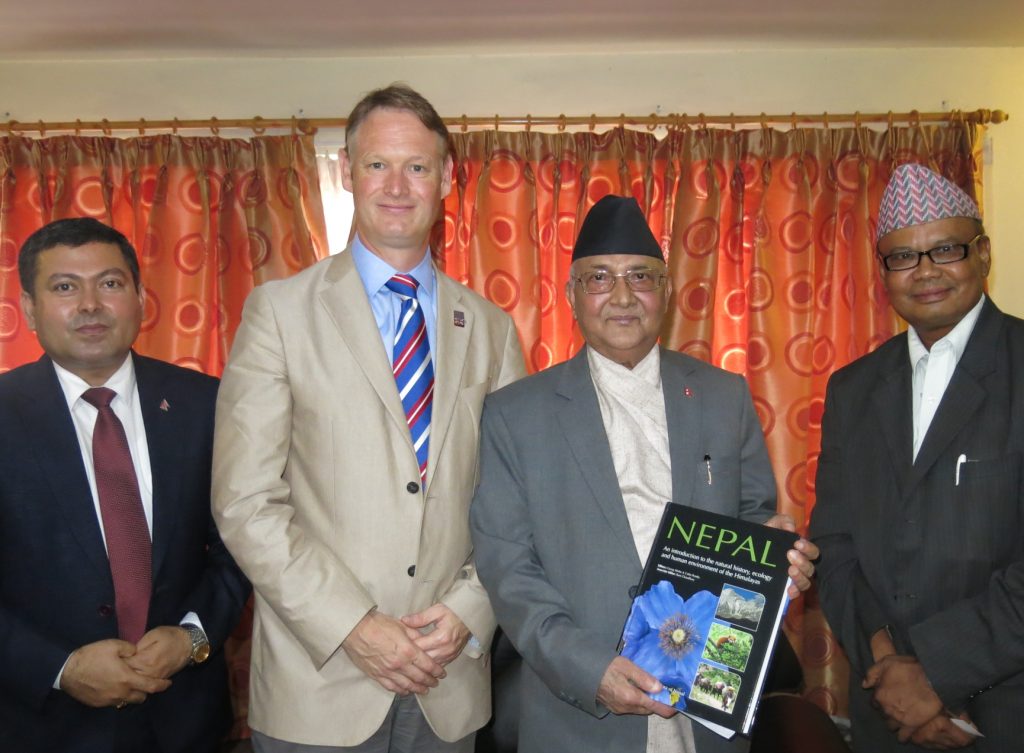 Whilst visiting Nepal in late June, Mark Watson met the Rt. Hon’ble Prime Minister of Nepal, Khadga Prasad Oli, at his Residence in Baluwatar, Kathmandu. Mark was joined by Prof. Ram Prasad Chaudhary of Tribhuvan University (right) and Dr Bishwa Nath Oli (left), Secretary of the Ministry of Population and Environment, to discuss the Flora of Nepal and RBGE’s other collaborative biodiversity research projects with Nepalese partners.
Whilst visiting Nepal in late June, Mark Watson met the Rt. Hon’ble Prime Minister of Nepal, Khadga Prasad Oli, at his Residence in Baluwatar, Kathmandu. Mark was joined by Prof. Ram Prasad Chaudhary of Tribhuvan University (right) and Dr Bishwa Nath Oli (left), Secretary of the Ministry of Population and Environment, to discuss the Flora of Nepal and RBGE’s other collaborative biodiversity research projects with Nepalese partners.
Prof. Chaudhary presented the Prime Minister with a copy of the newly published companion volume to the Flora of Nepal – Nepal: an introduction to the natural history, ecology and human environment of the Himalayas – which he edited with George Miehe (Marburg University) and Colin Pendry (RBGE). This book lays out the current understanding of the region, presenting new data and new perspectives in 17 chapters written by experts in their field. This landmark publication provides extended and updated knowledge in natural history, ecology and the environment and will act as a source book for environmental researchers, planners and policy makers working in Nepal and its neighbouring countries.
 Mark also briefed the Prime Minister on the recently completed Biodiversity Education Garden in the National Botanic Garden, Kathmandu. This was supported by the British Embassy in Kathmandu, and created by RBGE joining hands with the Department of Plant Resources, Ministry of Forests and Soil Conservation. The Biodiversity Education Garden is intended to inspire people and raise awareness of the importance of plant biodiversity in Nepal, particularly for school children and students. The Garden also commemorates the bicentenary of the Britain-Nepal bilateral relationship being celebrated in 2016. In parallel, RBGE is developing a Nepal area in the Inverleith garden, and we will be celebrating the bicentenary with a major exhibition of botanical art in the John Hope Gateway, opening in August.
Mark also briefed the Prime Minister on the recently completed Biodiversity Education Garden in the National Botanic Garden, Kathmandu. This was supported by the British Embassy in Kathmandu, and created by RBGE joining hands with the Department of Plant Resources, Ministry of Forests and Soil Conservation. The Biodiversity Education Garden is intended to inspire people and raise awareness of the importance of plant biodiversity in Nepal, particularly for school children and students. The Garden also commemorates the bicentenary of the Britain-Nepal bilateral relationship being celebrated in 2016. In parallel, RBGE is developing a Nepal area in the Inverleith garden, and we will be celebrating the bicentenary with a major exhibition of botanical art in the John Hope Gateway, opening in August.
 The Prime Minister was interested to hear about the DFID-funded Plants and You project which presents scientifically accurate information in user-friendly, bilingual, pictorial guides for use by everyone: from villagers in remote communities to high-level decision-makers in Government. The Prime Minister recognised the importance of these kinds of tools in supporting livelihoods and sustainable development, and stressed the use local plant names for effective communication and to promote wider understanding.
The Prime Minister was interested to hear about the DFID-funded Plants and You project which presents scientifically accurate information in user-friendly, bilingual, pictorial guides for use by everyone: from villagers in remote communities to high-level decision-makers in Government. The Prime Minister recognised the importance of these kinds of tools in supporting livelihoods and sustainable development, and stressed the use local plant names for effective communication and to promote wider understanding.
Prof. Chaudhary also presented a copy of this work to the Hon’ble Vice Chairman of the National Planning Commission of Nepal, Dr Yuba Raj Khatiwada.
